
 It’s human nature for people to believe what they want to and disbelieve what they don’t. That must be why so many believe the paid professional advocates (PPAs) who earn their livings shilling for pressure groups such as the Sierra Club and the Union of Concerned Scientists when they say we can have something for nothing — the proverbial “free lunch” — simply because they desperately want it.
It’s human nature for people to believe what they want to and disbelieve what they don’t. That must be why so many believe the paid professional advocates (PPAs) who earn their livings shilling for pressure groups such as the Sierra Club and the Union of Concerned Scientists when they say we can have something for nothing — the proverbial “free lunch” — simply because they desperately want it.
These vocal but technically ignorant types swarm around every auto industry issue, but none more than CAFE (Corporate Average Fuel Economy), that misguided and misunderstood law that mandates economy for every maker’s entire sales fleet.
PPAs and politicians insist that automakers could deliver 40-mpg SUVs if they really wanted to. Equally ignorant mainstream media, who tend to believe PPAs without question, excoriate “Detroit” for “resisting the need for higher economy” while conveniently ignoring the fact that every other automaker — including the two who have painted themselves ultra-“green” by selling a few thousand heavily subsidized hybrids — are boosting sales of their biggest, heaviest, least fuel efficient trucks and SUVs as fast as they can.
As an engineer who spent a number of years toiling on a major manufacturer’s vehicle efficiency team, allow me to explain some simple facts. First, a vehicle’s fuel consumption is mostly a function of its weight. It takes X energy to move Y pounds at Z speed. Acceleration of that mass to that speed uses a big chunk of energy. Aerodynamic drag then plays a major role.
Engineers can reduce a vehicle’s consumption primarily by reducing its size and weight and secondarily by streamlining its body. Beyond these major factors, what remains are incremental enhancements in vehicle and powertrain efficiency. But the easiest, most affordable improvements were made long ago. What remains are measures worth tenths of miles per gallon at much higher costs. And, contrary to what PPAs want us to believe, they are not accumulative.
PPAs add up the most optimistic potential of all available and experimental technologies — while discounting the enormous cost and years required to develop and validate each one to ensure its long-term safety, quality, reliability and durability — to claim that automakers have technology “on the shelf” to deliver 40-mpg SUVs. But if any company could do that, without grossly inflating the price , why would it not…and blow its competition away?
CAFE mandates the sales-weighted average economy of the total car and truck fleets each company sells in a given year. A full-line automaker, because it would take a decade and billions of dollars to reengineer its entire fleet, has to change the “mix” of vehicles it sells to meaningfully raise its CAFE. It must somehow sell more of the smaller, more efficient vehicles that few Americans want as long as gas remains plentiful and cheap, and fewer of the larger, more powerful, less efficient ones that buyers increasingly demand.
European and Japanese makers, who have long specialized in fuel-efficient small vehicles designed and developed for their own high-fuel-cost markets, mostly favor raising CAFE because it would give them a huge competitive advantage. U.S. makers, long dominant in larger vehicles, would be forced to sell far fewer of them, while off-shore brands could continue to expand sales of their larger, more profitable vehicles.
Cars and trucks weigh what they do primarily because of their capabilities. They are the size and weight they are to carry what they do, tow what they do, perform as they do and protect occupants in crashes as well as they do, at a given price level. A higher-economy SUV is by definition smaller and less capable. What combination of capabilities and features would buyers be willing to sacrifice for higher efficiency: Cargo capacity? Towing capability? Off-road and/or all-weather capability? Roominess? Ride? Safety?
“If you want people to eat less, you raise the price of food,” says GM North America Chairman Bob Lutz. “Instead, what the government is trying to do with CAFE is fight national obesity by making the clothing industry manufacture only small sizes.”
Contrary to what PPAs, politicians and the popular press want us to believe — and as much as we all wish there were — there is no free lunch at this CAFE.
Gary Witzenburg, a former advanced technology engineering manager and part-time racing driver, is a widely published auto writer and Editor at Large of Automotive Industries.









More Stories
Essential Features to Look for in ADAS Calibration Systems
Your Guide to Filing a Car Accident Claim
Steps to Take Immediately After a Car Accident